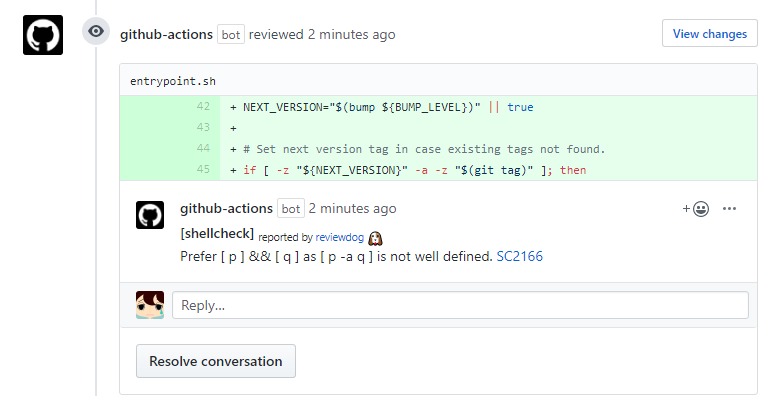GitHub Action
ReviewDog SQLFluff Linter
This GitHub Action enables you to lint and fix SQL code via SQLFluff for different dialects with the dbt templater.
Primarily I have favoured the Snowflake dialect, but there is also support for other dialects and can be extended by using the profiles.yml located in the testdata/dbt folder
If using multiple dialects, for example you might Materialize for real-time data and Snowflake for batch, then please create two separate workflows using this GitHub action. I will add examples below on how this can be done.
Note: any linting violations in the base commit will leave comments in the base commit, annotations will not work


Note: that you need to fix linting violations in the base commit first

inputs:
github_token:
description: 'GITHUB_TOKEN'
default: '${{ github.token }}'
workdir:
description: 'Working directory relative to the root directory.'
default: '.'
### Flags for reviewdog ###
level:
description: 'Report level for reviewdog [info,warning,error]'
default: 'error'
reporter:
description: 'Reporter of reviewdog command [github-pr-check,github-check,github-pr-review].'
default: 'github-pr-check'
filter_mode:
description: |
Filtering mode for the reviewdog command [added,diff_context,file,nofilter].
Default is added.
default: 'added'
fail_on_error:
description: |
Exit code for reviewdog when errors are found [true,false]
Default is `false`.
default: 'false'
reviewdog_flags:
description: 'Additional reviewdog flags'
default: ''
### Flags for dbt ###
dbt_adapter:
description: |
The dbt adapter is the dialect (e.g. snowflake)
This will install the correct adapter version of dbt
default: snowflake
dbt_adapter_version:
description: |
The dbt adapter version
This may not match the dbt-core version in some cases
default: 1.7.4
dbt_core_version:
description: |
As of dbt version 1.8, the dbt-core version will need to be specified
Henceforth I have added this as an input
default: 1.7.14
dbt_profiles_dir:
description: |
Will also need to set this up in the .sqlfluff file, needs to be relative to your dbt project directory
Recommend you copy the profiles_linter directory and place this in your dbt project
default: ./profiles_linter
dbt_project_dir:
description: This is where your dbt project directory is located
default: ./testdata/dbt
dbt_target:
description: |
The name of the target you need
Recommend you copy the profiles_linter directory and place this in your dbt project
default: snowflake
### Flags for sqlfluff ###
sqlfluff_mode:
description: |
fix or lint:
- fix shows suggestions of how to fix your code within your PR
- lint reports violations will only report the violation
default: lint
sqlfluff_templater:
description: templater for the sql, you probably won't need to change this
default: dbt
sqlfluff_version:
description: Version for sqlfluff
default: 3.0.6By default these are the actions you should use for linting or fixing SQL files within a dbt project These will execute the Snowflake adapter and releveant profiles within your dbt directory.
name: sqlfluff lint
on: [pull_request]
jobs:
test-pr-review-lint:
name: runner / sqlfluff-lint (github-pr-review)
runs-on: ubuntu-latest
permissions:
contents: read
pull-requests: write
env:
ACCOUNT: ${{ secrets.ACCOUNT }}
USERNAME: ${{ secrets.USER }}
PASSWORD: ${{ secrets.PASSWORD }}
DATABASE: ${{ secrets.DATABASE }}
SCHEMA: ${{ secrets.SCHEMA }}
WAREHOUSE: ${{ secrets.WAREHOUSE }}
steps:
- uses: actions/checkout@v4
- uses: tetracionist/action-reviewdog-sqlfluff@v0.2.0
with:
github_token: ${{ secrets.github_token }}
dbt_project_dir: ./testdata/dbt
level: error
reporter: github-pr-review
sqlfluff_mode: lint
name: sqlfluff fix
on: [pull_request]
jobs:
test-pr-review-fix:
name: runner / sqlfluff-fix (github-pr-review)
runs-on: ubuntu-latest
permissions:
contents: read
pull-requests: write
env:
ACCOUNT: ${{ secrets.ACCOUNT }}
USERNAME: ${{ secrets.USER }}
PASSWORD: ${{ secrets.PASSWORD }}
DATABASE: ${{ secrets.DATABASE }}
SCHEMA: ${{ secrets.SCHEMA }}
WAREHOUSE: ${{ secrets.WAREHOUSE }}
steps:
- uses: actions/checkout@v4
- uses: tetracionist/action-reviewdog-sqlfluff@v0.2.0
with:
github_token: ${{ secrets.github_token }}
dbt_project_dir: ./testdata/dbt
level: error
reporter: github-pr-review
sqlfluff_mode: fix
If you have multiple adapters, e.g. Snowflake for batch data and Materialize for Real-time, then consider the following to lint these.
name: sqlfluff multi-adapter lint
on: [pull_request]
jobs:
test-pr-review-lint-snowflake:
name: runner / sqlfluff-snowflake-lint (github-pr-review)
runs-on: ubuntu-latest
permissions:
contents: read
pull-requests: write
env:
ACCOUNT: ${{ secrets.SNOWFLAKE_ACCOUNT }}
USERNAME: ${{ secrets.SNOWFLAKE_USER }}
PASSWORD: ${{ secrets.SNOWFLAKE_PASSWORD }}
DATABASE: ${{ secrets.SNOWFLAKE_DATABASE }}
SCHEMA: ${{ secrets.SNOWFLAKE_SCHEMA }}
WAREHOUSE: ${{ secrets.SNOWFLAKE_WAREHOUSE }}
steps:
- uses: actions/checkout@v4
- uses: tetracionist/action-reviewdog-sqlfluff@v0.2.0
with:
github_token: ${{ secrets.github_token }}
dbt_project_dir: ./testdata/dbt
level: error
reporter: github-pr-review
sqlfluff_mode: lint
test-pr-review-lint-materialize:
name: runner / sqlfluff-materialize-lint (github-pr-review)
runs-on: ubuntu-latest
permissions:
contents: read
pull-requests: write
env:
HOSTNAME: ${{ secrets.MATERIALIZE_HOSTNAME }}"
USERNAME: ${{ secrets.MATERIALIZE_USER }}
PASSWORD: ${{ secrets.MATERIALIZE_PASSWORD }}
DATABASE: ${{ secrets.MATERIALIZE_DATABASE }}
SCHEMA: ${{ secrets.MATERIALIZE_SCHEMA }}
CLUSTER: ${{ secrets.MATERIALIZE_CLUSTER }}"
steps:
- uses: actions/checkout@v4
- uses: tetracionist/action-reviewdog-sqlfluff@v0.2.0
with:
github_token: ${{ secrets.github_token }}
dbt_adapter: materialize
dbt_project_dir: ./testdata/dbt
level: error
reporter: github-pr-review
sqlfluff_mode: lint
name: sqlfluff multi-adapter fix
on: [pull_request]
jobs:
test-pr-review-fix-snowflake:
name: runner / sqlfluff-snowflake-fix (github-pr-review)
runs-on: ubuntu-latest
permissions:
contents: read
pull-requests: write
env:
ACCOUNT: ${{ secrets.SNOWFLAKE_ACCOUNT }}
USERNAME: ${{ secrets.SNOWFLAKE_USER }}
PASSWORD: ${{ secrets.SNOWFLAKE_PASSWORD }}
DATABASE: ${{ secrets.SNOWFLAKE_DATABASE }}
SCHEMA: ${{ secrets.SNOWFLAKE_SCHEMA }}
WAREHOUSE: ${{ secrets.SNOWFLAKE_WAREHOUSE }}
steps:
- uses: actions/checkout@v4
- uses: tetracionist/action-reviewdog-sqlfluff@v0.2.0
with:
github_token: ${{ secrets.github_token }}
dbt_project_dir: ./testdata/dbt
level: error
reporter: github-pr-review
sqlfluff_mode: fix
test-pr-review-fix-materialize:
name: runner / sqlfluff-materialize-fix (github-pr-review)
runs-on: ubuntu-latest
permissions:
contents: read
pull-requests: write
env:
HOSTNAME: ${{ secrets.MATERIALIZE_HOSTNAME }}"
USERNAME: ${{ secrets.MATERIALIZE_USER }}
PASSWORD: ${{ secrets.MATERIALIZE_PASSWORD }}
DATABASE: ${{ secrets.MATERIALIZE_DATABASE }}
SCHEMA: ${{ secrets.MATERIALIZE_SCHEMA }}
CLUSTER: ${{ secrets.MATERIALIZE_CLUSTER }}"
steps:
- uses: actions/checkout@v4
- uses: tetracionist/action-reviewdog-sqlfluff@v0.2.0
with:
github_token: ${{ secrets.github_token }}
dbt_adapter: materialize
dbt_project_dir: ./testdata/dbt
level: error
reporter: github-pr-review
sqlfluff_mode: fixYou can bump version on merging Pull Requests with specific labels (bump:major,bump:minor,bump:patch). Pushing tag manually by yourself also work.
This action updates major/minor release tags on a tag push. e.g. Update v1 and v1.2 tag when released v1.2.3. ref: https://help.github.com/en/articles/about-actions#versioning-your-action
This reviewdog action template itself is integrated with reviewdog to run lints which is useful for Docker container based actions.
Supported linters:
This repository uses reviewdog/action-depup to update reviewdog version.



